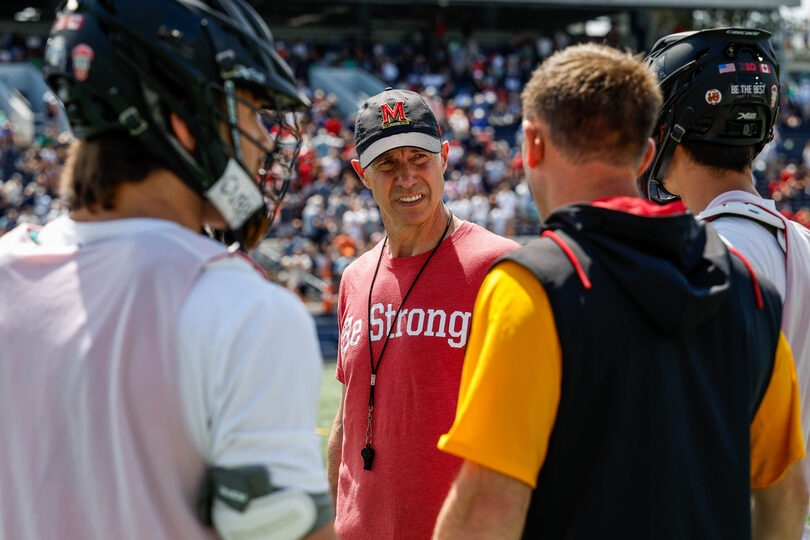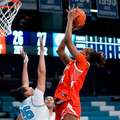John Tillman’s central New York roots shaped him into premier coach at Maryland

Maryland head coach John Tillman honed his lacrosse skills in central New York. Now, he looks to stay undefeated with the No. 2 seed Terrapins against No. 6 seed Syracuse in the Final Four. Courtesy of Maryland Athletics
Get the latest Syracuse news delivered right to your inbox. Subscribe to our sports newsletter here.
John Tillman’s rise to becoming one of college lacrosse’s most respected coaches began with a job that demanded the traits he’s showcased today: being likable, approachable and relentlessly strategic.
After his playing career at Cornell concluded in 1991 and while pursuing his master’s at Ithaca College, Tillman became a volunteer assistant coach with the Bombers. It wasn’t glamorous, but he said it was key to his coaching development.
It paid a $2,400 stipend before taxes and insurance. To make ends meet, Tillman poured beers and wiped down bar tops as a bartender at two local pubs. He learned how to read people, manage tension and command a room.
“He was one of the best bartenders in Ithaca,” former Bombers head coach Jeff Long, who gave Tillman his coaching job, said. “He lived on very little sleep. He’s a guy who can mediate and negotiate at 1:30 in the morning.”
Tillman doesn’t pour drinks anymore. Instead, he pores over film. Since taking the reins at Maryland in 2011, he’s turned the Terrapins into a relentless machine, capturing two national titles while making 11 Final Fours and eight conference regular season championships. He’s a master tactician, a culture-builder and one of the game’s sharpest talent developers. And he’s become Syracuse’s boogeyman, boasting a 7-0 record against the Orange.
Now comes Tillman’s biggest meeting yet: No. 2 seed Maryland facing No. 6 seed Syracuse in the Final Four Saturday. Tillman is 8-2 in national semifinals, while the Orange are back in the Final Four for the first time since 2013.
“Tillman knows the opponent better than they know themselves,” Terry Foy, Inside Lacrosse’s CEO, said. “He goes so far beneath the surface and can glean and understand the combination of what teams do, why they do it and then also how he can prepare his team to take away their opponent’s desired plan.”

John Tillman looks on with his clipboard in hand during a Maryland men’s lacrosse practice. Tillman’s central New York roots shaped his rise to coaching greatness with the Terrapins. Courtesy of Maryland Athletics
Holy Cross head coach J.L. Reppert, who spent six years as an assistant coach under Tillman at Maryland, noted Tillman’s “detail-oriented” and hyper-competitive approach has fueled his success. Reppert stressed Tillman’s “non-negotiables” of playing clean lacrosse to influence his team.
Foy said if a player is outperforming someone ahead of him on the depth chart, Tillman rewards the reserve with playing time. In that respect, Foy said UMD’s culture under Tillman closely resembles a professional team in the National Basketball Association or the National Football League.
“One of the ways that continues to astound me is the fact that players’ scholarship numbers are kind of treated like a salary cap number, and if you’re not meeting the expectation that’s set by your scholarship, sometimes you get moved on from,” Foy said. “And that’s not something that happens very (often) many other places.”
Tillman’s relationship-building skills with his current and former players — no matter their role — also make him a tremendous coach, Foy said. He added the intonation is clear when you commit to the Terrapins. The program’s mantra is “Be the Best.”
“It’s a culture that is what’s differentiated, certainly more so than the tactics, because we’ve seen the tactics change pretty dramatically over the course of the last 15 years,” Foy said.
Reppert attributes Tillman’s “relentless pursuit of figuring out how to win” to the consistent culture at Maryland. Whether watching film, honing the offense’s shooting or staying with goalies after practice, Reppert said Tillman’s commitment puts the Terrapins in a position to succeed.
While an assistant coach at Navy, Reppert also played under Tillman, describing him as a “people person.” He’d make sure an 18-year-old lacrosse recruit, a regular at one of Ithaca’s watering holes or a member of Ithaca’s women’s soccer team, which Long also coached, “wasn’t getting in trouble at night,” he said.
Though after graduating from Cornell, Tillman’s aspirations stemmed far from coaching at Ithaca. He hoped to move to Australia to teach, coach and continue his playing career. Those plans didn’t pan out, but then-Ithaca assistant coach Rich Barnes knew Tillman and vouched for him to Long.
“We connected, and we just immediately had a good little bond,” Long said.
Long said Tillman entered with confidence and deep lacrosse knowledge. Growing up in Corning, New York, Tillman drove from his hometown to watch local collegiate powerhouses, including Syracuse, Cornell and Hobart.
“There wasn’t the TV coverage there is now,” Tillman said. “So if you wanted to watch lacrosse, you had to get your car and go.”
Tillman started college as a freshman goalie at Colgate, but he transferred to Cornell shortly after. Big Red assistant coach Keith Reitenbach warned him they already had an All-American goalie, but Cornell still added Tillman after his high school coach at Corning West, Joe Stratton, told Reitenbach that Tillman was “the best athlete on the team, and he put you in goal because he needed a goalie.”
Tillman adapted, switching to long-stick defense and experimenting with midfield and offense. The change paid off. Cornell made the NCAA Tournament in 1989, and Tillman said his lacrosse IQ soared from playing all over the field under legendary coach Richie Moran.
“I was fortunate to get both sides of it,” Tillman told The Star-Gazette in 2017. “That really helped my understanding … learning almost every aspect of the game from some really good coaches.”
As Tillman’s coaching career continued, he replicated renowned SU head coach Roy Simmons Jr.’s drive to empower players. At Ithaca, Long said Tillman worked with the defense, but despite it being his first coaching experience, Tillman’s lacrosse knowledge flashed instantly.
It’s continued to shine in College Park. Despite the attention Tillman garners for his late-season performances, the same culture and preparation established earlier in the campaign have allowed postseason success, Foy said. He added Maryland won’t have a hard time remembering the Syracuse scouting report from its 11-7 win in February.
Foy said winning teams face two major challenges in a rematch. The first is complacency. When you’ve already beaten a team, squads can often take the second meeting for granted. Tillman has proven he can annul that. Also, the victor is incentivized not to change anything, since what it did the first time worked. Tillman has shown his strategy may change, but the results often stay the same — he wins.
Tillman knows the opponent better than they know themselves. He goes so far beneath the surface and can glean and understand the combination of what teams do, why they do it and then also how he can prepare his team to take away their opponent’s desired plan.Terry Foy, CEO of Inside Lacrosse
“He has a way of, again, having those core principles, which are kind of timeless, frankly, but then working around those and being able to adapt and being flexible and changing with the times,” Reppert said. “Call it a new season. Call it a new team. He just does a great job of figuring out how to maximize the team and the team’s potential.”
While at Ithaca, Tillman was one of three drivers assigned to lead the lacrosse team’s spring break caravan to Florida alongside Long and former Bomber player and current Le Moyne head coach Dan Sheehan. The plan was simple: travel together and rotate drivers. But soon after hitting Elmira, New York, the vans lost contact. While some vans took turns behind the wheel, Tillman drove his entire group of players the full 22 hours nonstop. Tillman figured it was safer that way.
It turns out driving a van for nearly a whole day was just the beginning. At Maryland, Tillman’s turned those same instincts and the ones from upstate New York as a master behind the bar — reading the room, managing pressure and knowing your people — into a championship formula. And those nights pouring drinks and driving 22 hours straight? They’ve never left him.
“I still think that’s how he lives his life,” Long said. “Obviously, he doesn’t need to be swinging beers at 2 a.m. down in College Park. He’s just a workhorse, man. He’s a 24 (hour), 12 months a year guy. He takes great pride in what he does.”





